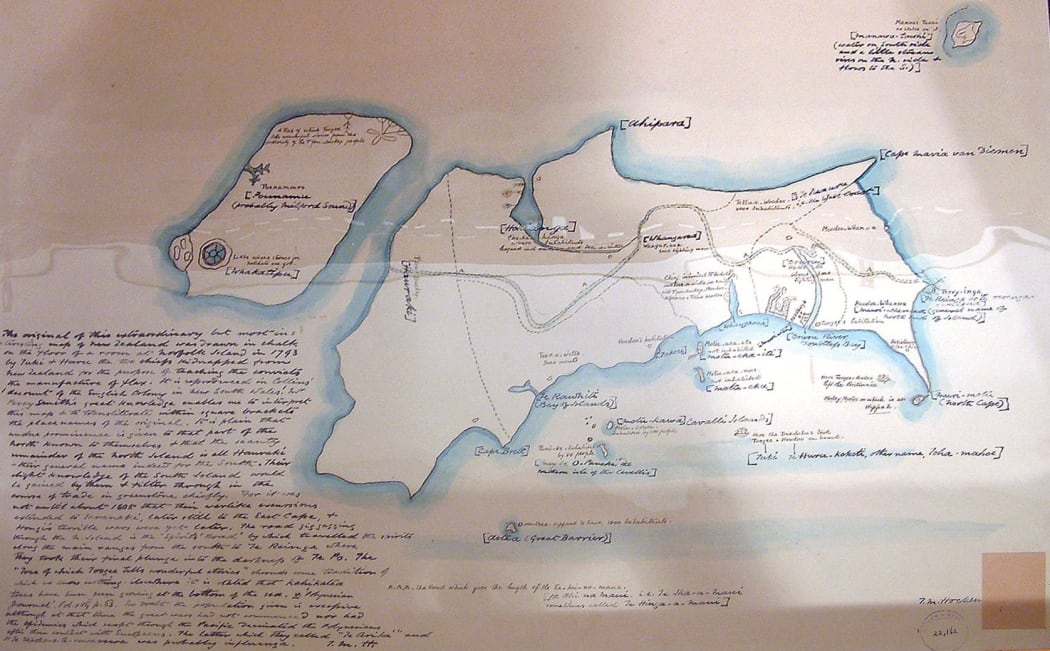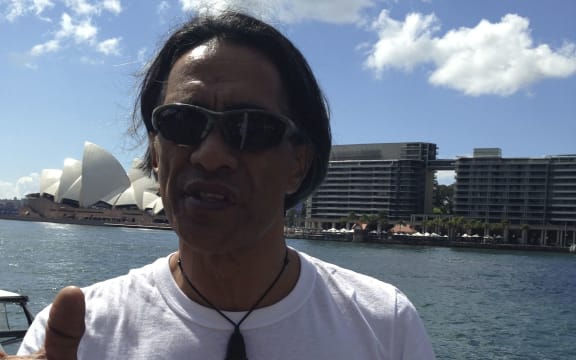New Zealanders in Sydney are preparing for celebrations this week to mark a milestone of Māori history in Australia.

Map of New Zealand originally drawn in chalk by Māori Chiefs Tuki Tahua and Ngāhuruhuru on Norfolk Island, 1793. Photo: Supplied: Otago University
Māori have had a long association of trade, migration and heritage with Australia since 1793.
In that year two Northland ancestors arrived in Sydney after being kidnapped by the British.
The following years saw Māori establish a strong economy of trade with New South Wales, enabling the survival of the fledging colony.
But the manager of Kotahi Tourism, Hohepa Ruhe, who is based in Sydney, says trade between the two countries started from very humble roots.
"For a start, the two men in question who started this whole journey for Māori in 1793 were Tuki Tahua and Ngāhuruhuru," Mr Ruhe said.

Hohepa Ruhe, manager of Kotahi Tourism in Sydney. Photo: Kotahi Tourism / Poihakena Tours
"These two gentlemen were kidnapped from the far north of New Zealand...(and arrived in Sydney on 15 April 1793) ... they were then put on another vessel a couple of days later and taken through to Norfolk Island."
The pair were sent to Norfolk Island to teach the prisoners there the art of flax dressing.
"Also, it cannot be stated enough that the beginning (of trade) was all due to harakeke - the humble flax which actually had a relative growing on Norfolk Island".
Mr Ruhe said there was evidence that connections between New Zealand, which was still part of the colony of New South Wales at the time, and Australia started much earlier.
"Previous to 1788 in the setting up of the colony there were already schemes and plans that (the first Governor of NSW) Arthur Phillip ... had in order to, how would you say, make resource deals with New Zealand, or Māori."
Mr Ruhe said this was inspired by Captain James Cook's discoveries, and the taking of Māori artefacts back to Great Britain.
Long links between Māori and indigenous Australians
Mr Ruhe said there were records from the late 18th and early 19th centuries of the bond Māori had formed with the local tāngata whenua in Sydney.
"Its seems pretty well that Māori and the local Koori populations got on very well together [and] actually had corroboree (cultural interaction) with the local people. We [Māori] introduced waiata [songs] and apparently had quite the friendly relationship."
The Ngāti Tūwharetoa, Ngāti Toa, Ngāti Raukawa and Ngāpuhi man said that that amicable association still existed today and was, in fact, getting stronger.
"It appears we are finding, how would you say, common grounds on which to support each other, especially with the latest verbalisations by the Australian government about relocating (indigenous) people because of 'lifestyle' choice.
"That seems to have hit a big nerve not just with Māori here but also Māori in New Zealand."
Mr Ruhe said that had brought Māori and Aboriginal and Torres Strait Islander people even closer together.
"That has sort of steamrolled to Māori identifying a brotherhood with our local Koori brothers and sisters and seems to be solidifying more and more, especially through social media."
Mr Ruhe said the period between 1793 and when the Treaty of Waitangi was signed in 1840 was a fascinating time in history.
He said it was a time when Māori entrepreneurship flourished and helped to boost the New Zealand economy, with the trade connections Māori had made with merchants in Australia who valued their resources and the way Māori did business.
But he said after the 1840s and during the land wars that followed Māori trade with Australia failed due to the colonial government in New Zealand taking control of the industry.
As part of the celebrations a tour will take place on Wednesday 15 April, on the 222nd anniversary in Gadigal Country, the tribal rohe of the tāngata whenua.

